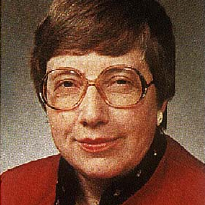 Nina Matheny Roscher (1938-2001) was an American chemist, historian, and advocate for women and minorities in science. Mentoring is an often-undervalued aspect of science, but Roscher's contributions were so great they got the White House's attention; in 1998, she received the Presidential Award for Excellence in Science, Mathematics and Engineering Mentoring.
Nina Matheny Roscher (1938-2001) was an American chemist, historian, and advocate for women and minorities in science. Mentoring is an often-undervalued aspect of science, but Roscher's contributions were so great they got the White House's attention; in 1998, she received the Presidential Award for Excellence in Science, Mathematics and Engineering Mentoring.
Roscher was born in Uniontown, Pennsylvania in 1938. After receiving a degree in chemistry from the University of Delaware (1960), she earned a PhD in physical organic chemistry in 1964. She taught at the University of Texas and Rutgers University before joining the faculty of American University (AU) in Washington, D.C. in 1974, where she stayed until her death in 2001.
At AU, she was a powerful figure; in addition to teaching chemistry, conducting research on sunscreens, and mentoring graduate students (the majority of whom were female), she held a variety of influential administrative roles including chair of the chemistry department, dean for graduate affairs and research, vice provost for academic services, and dean for faculty affairs.
Her advocacy for female chemists began early (while at Purdue, she founded a chapter of the Honor Society for Women in Chemistry) and never ceased. Together with her AU colleague, mathematician Mary Gray, she brought in millions of dollars work of grant money to improve resources for women and minorities in mathematics and science including a science policy apprenticeship. She also administered a National Science Foundation (NSF)-funded reentry program to retrain women with degrees in chemistry or biology who had previously been discouraged from pursuing careers in those fields. The program was immensely successful, with the participants, some of whom had been out of school for over a decade, finding positions in a variety of jobs. In addition to her work at AU, she held a part-time position as program director of science education for the NSF and was very active in the American Chemical Society (ACS).
She was interested in the history of women in chemistry, writing the book Women Chemists (1995), and much of her extensive research on female chemists is archived in the Archives of Women in Science and Engineering at Iowa State University where they are accessible to (and frequently utilized by) science historians. She also looked to the present and future of women in chemistry, analyzing statistics on disparities in training, retention, and compensation of female scientists. There is no doubt that Roscher herself played a key role in ensuring a better and more diverse future for chemistry.
Photo Credit: C&EN
[sharethis-inline-buttons]
